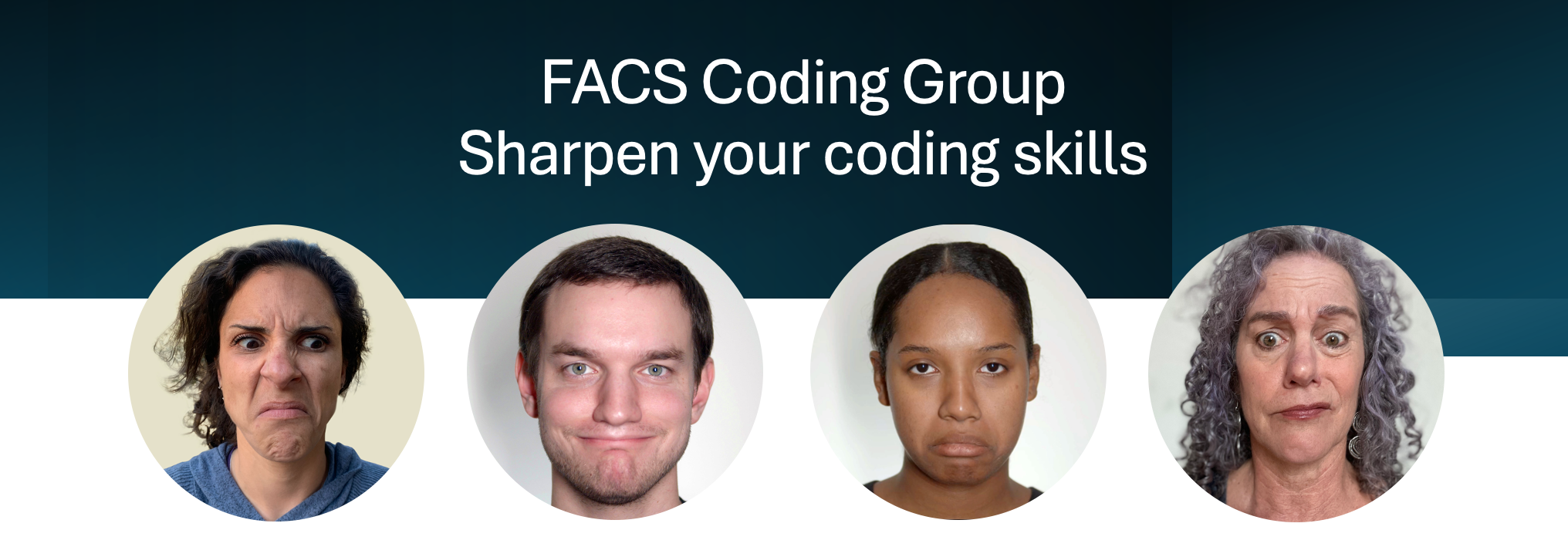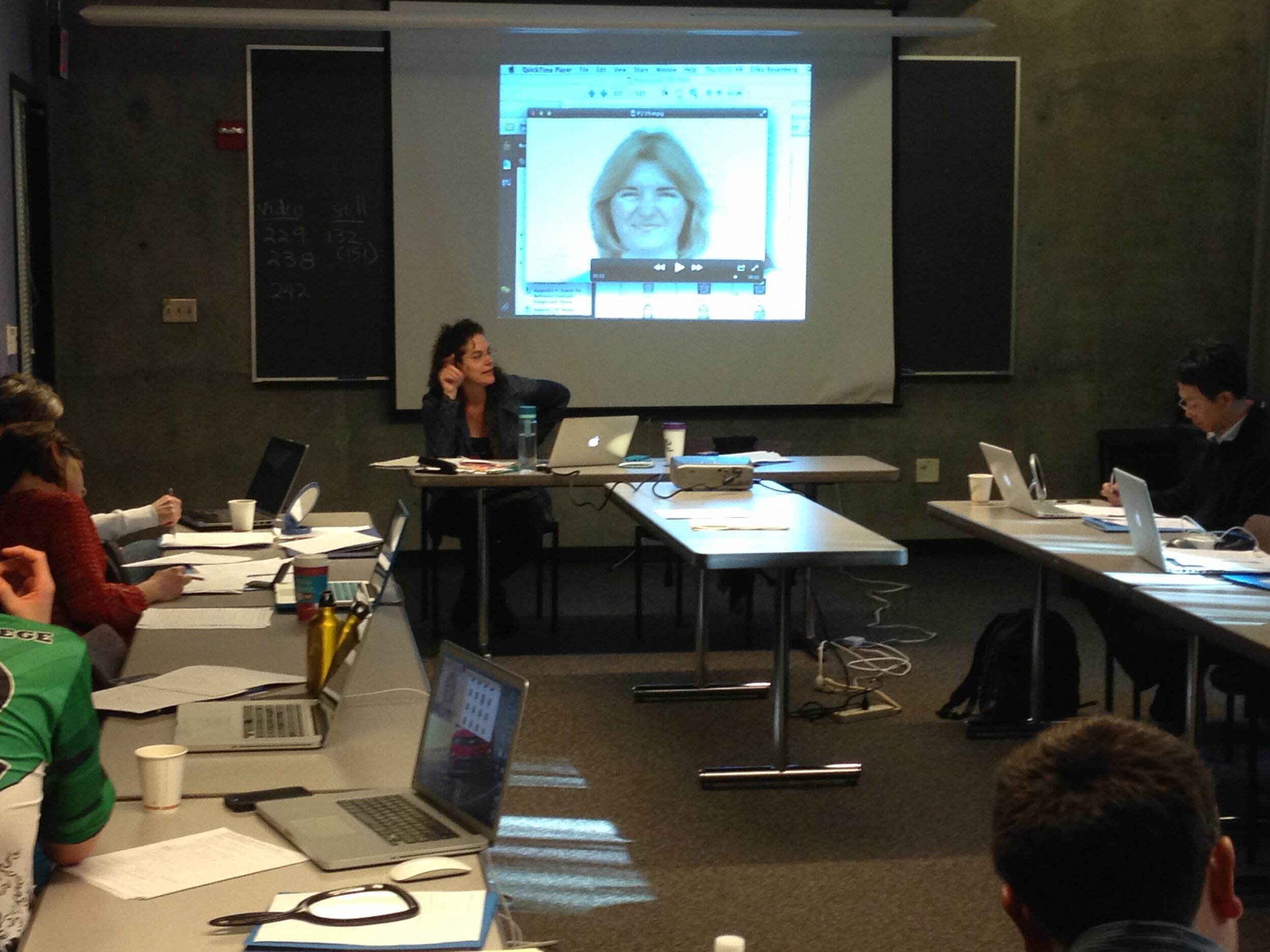
Learn the Facial Action Coding System (FACS)
The Facial Action Coding System (FACS) is a comprehensive, anatomically-based system for coding all observable facial behavior that has been used in a wide range of applied and basic research contexts, from research on emotion, communication, and psychopathology to health psychology, forensics, and the digital arts.
Learn from an expert with over 30 years experience in research, development, and training with FACS.
Erika Rosenberg, Ph.D., offers FACS Training through in-person and online FACS courses, as well as private online tutoring.
Upcoming FACS Trainings
Erika Rosenberg’s FACS LIVE Online Course: October 2024
Registration for October 2024 is now open!
This online workshop is a LIVE training on Zoom. The course starts Tuesday, October 15, 2024 and meets for live training class sessions Tuesdays, 9-11am Pacific Time. We will meet weekly live on Zoom for 9 sessions. Price is $990 USD. The online workshop includes 9 live interactive sessions on Zoom, pre-recorded material, and handouts. The class is small - with 12-18 people in the group. FACS coding homework is an essential aspect of this course and any FACS training. The FACS manual is required.
Full Schedule: The course involves 9 LIVE, interactive Zoom sessions, Tuesdays, 9-11 am Pacific time, except classes 1 and 2 (which are 2.5 hours, 8:30-11).
Date Session
October 15, 2024 1
October 22, 2024 2
October 29, 2024 3
November 5, 2024 4
November 12, 2024 5
November 19, 2024 6
November 26, 2024 7
December 3, 2024 8
December 10, 2024 9
FACS Milano 5 Day In-Person Training, October 7-11, 2024
Above: Image from our inaugural FACS Milano training in 2015
Workshop Schedule: October 7-11, 2024, 9:30am-6pm daily, Central European Time (Friday’s class will end at 4pm)
I’m excited to be returning to Milan, Italy to teach my original 5 day, in-person FACS training from October 7-11, 2024. The workshop will be taught in English with Italian translation provided on-site. Milan holds a special place in my heart, as I have been teaching FACS trainings there on a regular basis since 2015 at the invitation of Diego Ingrassia of I&G Management.
This event is sponsored and organized by I&G Management, and all registrations take place through them. To register, please click the button below to be taken to I&G’s registration page.
Brand New Offering Spring 2024: LIVE Online FACS Coding Group!
Need to brush up on your FACS coding skills? Perhaps a refresher to get back into shape after time off coding or maybe you are preparing to take the FACS final test and want some more practice? To address such needs and requests from former students, I have created a new offering: “FACS Coding Group.” It is a small coding practice group - designed for people who want to refresh or reinforce their FACS coding skills.
One-Day Master Classes Through Gamaste in France, Fall 2024
In the Fall of 2024 I am teaching Master Classes for Gamaste in France: September 30 in Paris, and October 2 in Lyon. Each one day master class is a brief, but in-depth FACS primer, featuring: a history of FACS’s development, a brief dive into the “how to’s” of this anatomically-based methodology for facial measurement, and a discussion of crucial considerations for the application of this measurement tool and knowledge of its parts (namely the action units or AUs) to the creation of moving faces in the arts. This primer should instill an appreciation for subtleties of facial movement, while helping the curious decide if learning more about FACS or the application of FACS is useful to them. A one-day training is not sufficient to learn the full FACS system, but it will be a deep sampling that gives the learner a good sense of what FACS is and how to apply it.
Private tutoring online:
Private tutoring packages: Get one-on-one, personalized FACS guidance and instruction from an expert who has worked with FACS for over 30 years. My private tutoring package includes 8, 90 minute sessions for $1700 USD. Sessions are paced as you like (weekly is recommended, regularity is required). All learners must have the FACS manual and be motivated to dig in to the material. Contact me with your interest here.
Individual, pay as you go, private tutoring slots: All learners must have the FACS manual. A limited number of slots are available now.
Quarterly FACS Drop-In Sessions — FREE! Next session: Summer 2024, exact date TBD
Have a FACS coding problem? Need advice on research with FACS? Come to my FREE quarterly FACS drop-in sessions! These are 90 min sessions akin to office hours, where people can drop in my Zoom “office” and ask coding questions, conceptual questions about FACS, have discussion, share ideas – whatever!
What is FACS?
Wondering what FACS is? In this video, I give you an 11-min rundown.
FACS is a system for describing facial action.
FACS describes facial movement on the basis of elemental units called action units or AUs. Each AU represents the movement that occurs when underlying muscle fibers contract. For instance, AU1, which occurs when frontalis, pars medialis contracts, lifts the inner corner of the eyebrow.
To learn each AU, coders learn the appearance changes associated with each action, practice performing the AU, and learn the intensity scoring for the action.
FACS expertise from Erika Rosenberg, Ph.D.
Erika Rosenberg, Ph.D. has been working with the Facial Action Coding System (FACS) since 1988, when she first learned it in Paul Ekman’s laboratory as his last PhD student. Since then she has worked with FACS and facial expression of emotion extensively, having personally coded thousands of hours of video, trained hundreds of people in FACS coding worldwide, both individually and in her original 5-day workshops, published dozens of research articles and books on facial expression, emotion, and FACS. Dr. Rosenberg has given invited addresses at numerous international conferences on psychology, medicine, law, and the digital arts on FACS and facial expression. She also consults on FACS, facial expression, deception, and emotion with academic, corporate, law enforcement, digital arts, and entertainment industry clients worldwide. Erika, who is widely regarded as Ekman’s protege and a world expert in FACS, is currently preparing the only Ekman-approved revision to the FACS manual.
In addition to the FACS training and consultation she offers through her own consulting company, Dr. Rosenberg serves as Chief Scientific officer at Humain Ltd and Consulting Scientist at the Center for Mind and Brain UC Davis.
History of the FACS workshop
5-day FACS Workshops
The 5-day FACS workshop, originally created by Dr. Rosenberg in 2004, takes you through the entire training manual for the Facial Action Coding System and helps prepare you for the final test for certification as a FACS coder. This workshop is the only FACS workshop endorsed by Paul Ekman. Dr. Rosenberg is developing an all new, in-depth online FACS training, which will be launched in mid-2021.
What to expect in the workshop:
Learn the AUs for each facial movement
Learn the intensity of each AU
Get practice coding with video images
Benefit from interction with others while learning the material
Guidance and expert advice
Get feedback on your coding
Since its first publication in 1978 by Ekman & Friesen, the FACS manual has been designed to be self-instructional. That is, people would read the manual, do practice coding with video images, and eventually take a final test for certification.
As the manual is long and tedious, many people benefit from interaction with others in learning the material. The workshop offers a dynamic group setting for learning FACS in about a week, with the benefit of guidance and feedback from an expert.
What People Are Saying about the FACS Workshop
“Dr. Rosenberg’s FACS workshop was invaluable. She is an excellent teacher. The five-day workshop was intense, but well worth the investment of time and effort. I believe that my knowledge of FACS is far better than if I had taught myself, and I am quite confident that I learned it, and passed the certification exam, in a dramatically accelerated time frame as a result of having participated in her workshop. I highly recommend her workshop to anyone motivated to learn FACS.”
— Marc Patry, Professor, Psychology Department, Saint Mary’s University
“Simply put, a dedicated and competent instructor with an engaging personality. An asset to her colleagues and community. Her comprehensive FACS workshop will alter your interactions, intended or otherwise. It was a pleasure!”
— Dr. Jason Cohen, Psy.D., Licensed Clinical Psychologist, Forensic & Clinical Practice
FAQs
What does this training qualify me to do?
After FACS training and passing the final test for certification, one is qualified to FACS code. This means they have learned a basic system for describing anatomical movement of the face, but this is not expertise nor license to teach FACS. Still, after the workshop and certification you will walk away with a level of understanding facial movement that few others in the world have. Realize that FACS was designed for researchers. I have trained researchers, therapists, physicians, business people, and animators. Anyone seriously interested in how and why the face moves (and there are numerous applications of that knowledge) can benefit from this training. It is a big commitment for big understanding.
Will this training prepare me to train others to FACS code?
Once you pass the FACS test, all you have demonstrated is that you know the AUs. FACS certification does not confer expertise. Certification means that you know the system well enough to code. It does not mean you know it well enough to train others. Consider this analogy – it is like obtaining your driver’s license. Once you pass the driving test and get your license it means you are qualified to drive a car. It does not mean that you are qualified to teach others to drive. Expertise in FACS requires accumulating extensive experience coding.
Can I learn this in less than 5 days?
FACS training was originally designed by Ekman & Friesen to be self-instructional, wherein one works alone with the manual. Using this method it takes at least 100 hours of self-study. The 5-day workshop is accelerated, but even that requires some advanced preparation. There is no way to shorten the training any further, as it would be incomplete. The emphasis is on expert instruction in FACS, the gold standard system of detailed measurement of observable, often subtle facial movements.
What if I just want to learn to identify emotions?
You will find that learning FACS will give you sensitivity to subtle facial movements that few others have. This is not, however, a workshop for learning to recognize emotions. Nor is it a course on deception detection. It is true that one of the main ways in which FACS has been applied is to the study of facial expressions of emotion, but emotional interpretations emerge in the data processing stage — not at the coding stage. The strength of FACS coding is its objectivity. I do spend some time in the workshop talking about techniques and resources for emotion interpretation, but our emphasis is on learning to code facial action using this powerful measurement technique.
You can get more simple training in recognizing facial expression of emotion without FACS training, in much less time, for much less money. If you want to become more attuned to the expression of the 7 basic emotions, you can go to Paul Ekman’s website and look into the micro-expression training. It will teach you how to recognize the prototypical emotion expressions in people’s faces, especially when they occur rapidly (as microexpressions). It does not teach about measuring facial movement, however, nor does it train you to detect very subtle facial changes.






